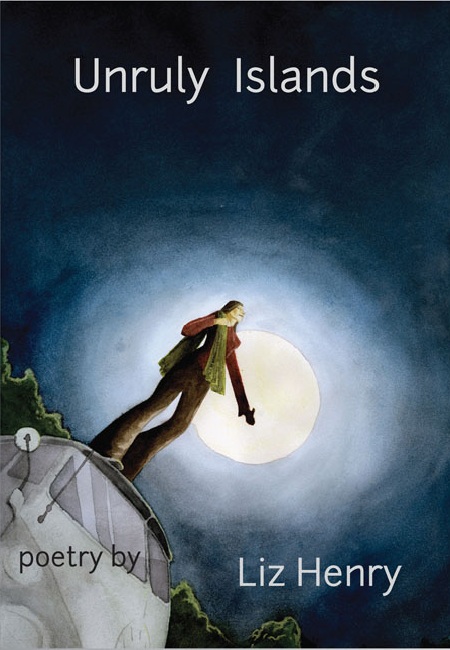Review: Unruly Islands, poetry by Liz Henry
by Brittany Warman
On her blog, Liz Henry describes her book of poetry, Unruly Islands (2012), as a collection of poetry for those who "really don't like poetry because it usually sucks and is embarrassing" (Henry 2012b). Henry's poetry is not at all the kind of poetry most people are thinking of when they say that "they don't like poetry." Viciously modern, biting, sometimes beautiful, and always fascinating, Henry's poetry is very much a product of the world she lives in. She describes her collection as "a weird trip through [her] brain" that incorporates "moon landing, modem noises, the dotcom crash, seasteading, surly teenage embezzlers, San Francisco alternate future geographies, and the history of utopianism from the Whole Earth Catalog through Riot Grrrl to Burning Man" (Henry 2012b) and it does indeed read very much like a strange peek into someone's mind, a jumbled, ever changing space. These poems are feminist, unconventional, science fiction texts.
One of the main characteristics of Henry's poems, particularly the longer ones, is their tendency to be made up of strings of strong but seemingly random images thrown together. It seems a bit strange at first but, as the text unfolds, those images suddenly and strikingly form a complete picture that hits the reader in a profound way. It's very subtle and I could rarely predict where any particular poem would go. It should be noted that this tactic does not work in every piece in which it is tried but when it does it is very powerful and frequently quite poignant.
Henry is fond of references in her poetry and this tendency gives her poems a modern grit that seems both familiar and strange. She tosses these references off casually and I found myself liking them more and more the more I read. These poems are engaged with technology, the Internet, and the way we live now. Etsy (Henry 2012a, 57), the oddness of airplanes (31), the Internet Archive (60), traffic jams (37), and many other aspects of contemporary life appear in these poems. References to "parallel universe[s] missed" (14) and titles like "I wake up as a giant robot" (11) underscore the distinctly science-fictional feel to the poetry and she frequently draws on speculative media as well, mentioning the film "Planet of the Apes" (17) and using the phrase "Spock and the Romulan commander" (22), for example.
Henry has a unique style of spacing phrases out, particularly in the first poems of the book, that I did not always find accessible. The spacing sometimes seems to fit extremely well and sometimes seems a bit too arbitrary for my taste. I found myself not being able to figure out the reasons behind particular spacing choices, which resulted in the rhythm of the work being thrown off for me instead of enhanced.
My personal highlights in the collection include "Information Manifesto," which I can hear spoken out loud so clearly (7), "Whole Earth Catalog," which has very memorable first lines about "log and match" and "paper and ink" meeting "as former trees" (55), and "Stars," an absolutely gorgeous, perfectly pared down poem that stuck with me long after the book was closed (67). Several of the shorter, untitled pieces near the end of the book are very thought provoking as well. My favorite poem in the text, however, was "Mother Frankenstein," which I was familiar with due to its first publication in Stone Telling. This poem has the reader from the very first line — "Mother Frankenstein swollen lightning / stitching needles where my lips kiss / in your smoke-ghost skull where axons / open fire with past love letters electric / little histories of the alphabet gathered / in your pathetic apron's outwash plain" (39). This piece is the perfect example of the way that Henry's poetic style can smack you in your heart and fill your mind with unbidden images and associations. The poem is haunting and I found myself re-reading it again and again.
Overall the collection is full of the compelling and unusual poetry that the world so desperately, constantly needs more of. Henry is a challenging and unique poet, a poet born of stars and the Internet, and I look forward to making more "weird trip[s] through [her] brain" (Henry 2012b).


